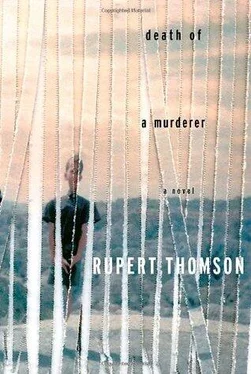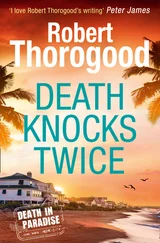Still standing outside the hospital mortuary, Billy noticed a movement at the far end of the corridor. Not a drowned boy or a fish, but a figure in dark clothes. This would be one of his colleagues, he thought, coming to relieve him. He checked his watch. Yes, it was nearly four. Another break, and then just a couple of hours to go. He watched as the policeman passed through alternating areas of light and shadow, almost vanishing one moment, only to emerge seconds later, bathed in a glow that was subterranean, oceanic. There was something hypnotic about the man’s calm progress, something almost eternal, and yet Billy felt separate from it, excluded. Like death looking at life.
Finally the constable stopped in front of him. “Not late, am I?”
“No, no,” Billy said. “Right on time.”
On his way to the snack bar, images from that day by the lake in Italy still lingered. He couldn’t remember what had happened after he walked into the roadside pizzeria. Had Raymond spent the night with that waitress? Billy had a vague memory of sleeping in a stuffy back room with all the cleaning equipment, and Raymond not being there, Raymond being somewhere else…
As Billy passed a toilet, the door opened and Phil Shaw appeared. His face looked chapped and blotchy. Probably he had been dowsing it in cold water, trying to keep himself awake.
“On your break, Billy?”
“I’m going to get a cup of soup,” Billy said. “I think I saw some in one of the machines.”
“Mind if I come with you?”
“Course not.”
At that moment, a nurse darted round them and into a nearby ward. On reaching the doorway, which was open, they both paused, curious as to the reason for her haste. Illuminated by a single lamp, an old man was sitting up in bed and vomiting stringy yellow fluid down the front of his pyjamas. “Oh God,” he gasped between oddly effortless bouts of retching. “God, bugger. Fuck.” One of the nurses attending to him held a grey cardboard container below his chin. He vomited again. “Disgusting,” he said. “This is bloody disgusting.” Another nurse arrived with a fresh pair of pyjamas. Phil touched Billy on the shoulder, and the two men moved on.
They covered fifty yards without speaking, then Phil gave Billy a sideways look. “Still want that soup?”
Phil was shaking his head. “You know, I never really understood it…”
Billy smiled. “There’s nothing to understand.”
“But you seem like such a natural for a sergeant.”
“I just didn’t want to be one. I still don’t.”
“What’s wrong with being a sergeant?”
“I didn’t say there was anything wrong with it.” Billy blew on his black coffee to cool it down. He could feel Phil watching him. “Not everyone’s ambitious,” he said. “I like being on the streets, I suppose. Close to the ground. Where things happen.”
“Even at your age?”
Phil was mocking him, but he was also making a serious point, which Billy took on board. “Well, we all burn out sooner or later,” he said, “whichever route we take.” He was thinking of Neil, of course. Neil who now lived above a launderette. Neil who claimed that there was nothing quite as soothing as drifting off to sleep to the sound of half a dozen giant tumble dryers.
“I still don’t understand it,” Phil said.
“This may disappoint you,” Billy said, “but I’m just keeping my head down, to be honest. It’s only a few years till I get my pension.” He paused. “I’ve put a lot into the job — maybe too much. I need to start thinking about my family.”
Phil held Billy’s gaze for a moment longer, then nodded slowly and looked down into his coffee.
It was different for Phil, Billy thought. He’d only done ten years. He still had a taste for the work, and someone in that position would find it hard to imagine what it felt like to be coming out the other side.
“Do you remember the barbecue we had at your place?” Phil said after a brief silence. “We were out in the garden, and suddenly that old bloke who was riding down the track fell off his bike.”
“Harry Parsons,” Billy said. “He hit a stone or something.”
“He went flying. Cut his head quite badly.”
“We had to call the ambulance.”
“The sausages all burned, remember?”
“And the chicken drumsticks. Sue had to get a meat pie out of the freezer.”
“We drank a lot that night, didn’t we?”
The episode had upset Billy. He would have gone to the hospital with Harry if the paramedics hadn’t told him it wasn’t necessary. Though Harry had never actually set foot in their house — modesty stopped him venturing beyond the back door — he was like a member of the family. If Billy ever had good news, Harry would be one of the first to know — and Harry had seen him at his lowest too…One night, not long after Emma was born, Billy was standing on the track behind his house when something seemed to reach down into him and wrench the tears out by force. He kept glancing at the bedroom window, afraid that Sue might hear. Then a piece of the darkness near him shifted and came loose, and a voice said, “Is that you, Billy?”
“Yes,” he managed. “Yes, it’s me.”
In good weather, Harry often sat up late in the allotments. He had his own shed and a couple of folding chairs. As he’d admitted to Billy once, he didn’t have much to go home to.
“Are you all right?” Harry said.
“I think so,” Billy said. “More or less.”
“I was just sitting here, having a beer.” The dark air flooded in around Harry’s voice, seeming to cushion it. “Would you like a beer, Billy?”
“Yes,” Billy said. “Thanks. That’d be great.”
“I think there’s one here somewhere…”
As Harry rummaged for a beer, Billy stepped closer. The apex of the shed’s roof showed black and sharp against the sky. Harry pushed a cool can into Billy’s hand and set up the other chair for him.
“That’s clever of you, Harry, keeping a drink out here.”
“Well,” Harry said, “you’ve got to, haven’t you?”
They sat side by side in the darkness. The beer tasted metallic, almost rusty, as if it had been made not from hops but from bits of old machinery.
“Sue asleep, is she?”
“I hope so.”
To keep the birds away, Harry had hung CDs from horizontal canes. When the air stirred, they would fidget, knocking and clicking against each other. Sometimes one of them glinted silver as it twisted on its string. After a while, a train clattered past.
“They go all the way to Liverpool Street, those electric trains,” Harry said. And then, sometime later, “When my wife died, I couldn’t stop crying for a month.”
Pinching his eyes against the glare of the snack-bar lights, Billy sighed, then took a sip of his black coffee.
“Is he still alive?” Phil asked.
“Harry?” Billy said. “Yes, he’s doing well. He still comes up to the allotments, even when it’s raining. He’s growing delphiniums again this year. He loves delphiniums.”
“Good for him.”
“When me and Sue got married, we invited Harry to our wedding. He came instead of my father. I’d never seen Harry in a suit before. Usually, in the summer, he just wears trousers and braces and a flat cap, and he’ll have chalky stains all over him from the talcum powder he puts on after he has a bath. The suit, though. It was brown tweed, stiff as cardboard — and he’d stuck one of his own nasturtiums in his buttonhole. You know what my best man, Neil, said? ‘Who’s the scarecrow?’” Billy smiled at the memory.
“Instead of your father?” Phil said.
“What?” Billy said. “Oh right — well, I couldn’t have invited him. I didn’t know where he was.”
Читать дальше












